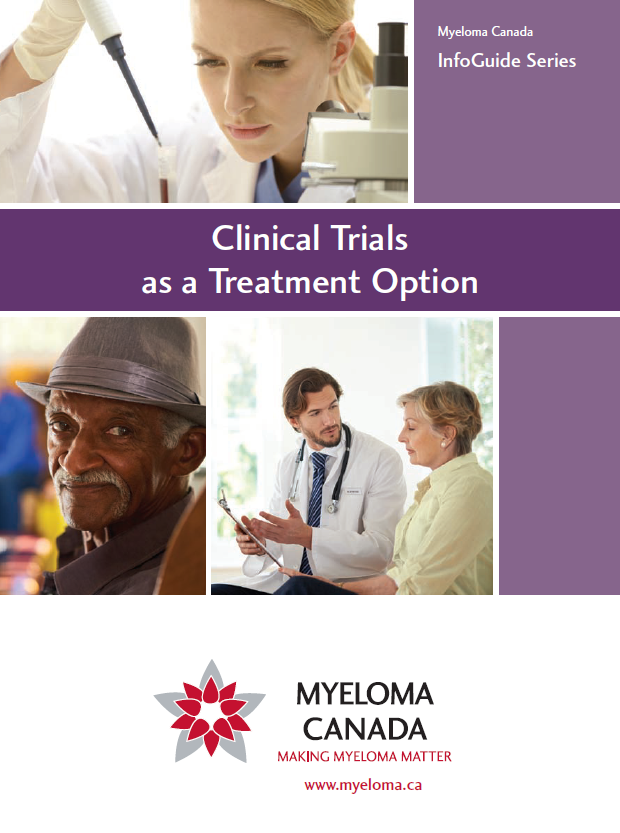What is a clinical trial?
A clinical trialResearch studies done with patients to evaluate new treatments or new ways of combining and administering existing treatments. By testing new drugs or combinations of drugs, each study is designed to find better ways to treat the disease, as well as improve quality of life and answer scientific and clinical questions. The overall goal of conducting clinical trials is to improve patient care and outcomes. is a research study done with patients to evaluate new treatments or new ways of combining and administering existing treatments.
By testing new drugs or combinations of drugs, each study is designed to find better ways to treat the disease, as well as improve quality of life and answer scientific and clinical questions.
The overall goal of conducting clinical trials is to improve patient care and outcomes.
Clinical trials allow researchers to gather information on a drug’s dose, effectiveness, and safety in humans. Their study protocolA detailed plan of treatment including the dose and schedule of any drugs used. (written plan) is designed to answer key research questions by comparing results from the different treatment arms (groups) that include either the experimental drug, standard of care, standard of care plus placeboAn inert (inactive) substance often used in clinical trials for comparison with an experimental drug., or their various combinations. These studies can be conducted by a single researcher in one hospital or clinic, or by many researchers at the national or international (global) level. Because clinical trial research involves both drugs and people, there are strict regulations in place to ensure the safety of participants.
Based on the specifics of your myeloma diagnosisThe process of identifying a disease by its signs and symptoms., a clinical trial may be an option to consider. There are clinical trials that are designed for each phase of the disease. The medical team may recommend turning to new drugs or combinations of treatments that are only available through participation in clinical trials.
Understanding Clinical Trials in Myeloma: Whiteboard video
Depending on where you live and the study protocol (written plan), another important consideration may be the amount of time and cost related to travelling for treatments and/or clinic visits.
Participating in a Multiple Myeloma Clinical Trial Part 1: Your Questions Answered
Lastly, all of the personal information collected during a clinical trial is confidential and will be protected, even after you have completed or left the study.

As a patient, you have rights and responsibilities when it comes to interacting with your healthcare team.
Questions to ask your healthcare team
Clinical trials may use language you aren’t yet familiar with. Learn what the different trial phases mean as well as other terms.
Understanding clinical trial phases
Goals:
- To find the safe maximum tolerated dose (MTD)
- To decide how the treatment should be given (eg, orally or intravenously)
- To observe how the treatment affects the human body
Goals:
- Uses the maximum tolerated dose (MTD) established during Phase I
- To determine if the treatment has an effect on a particular stageThe extent of a cancer in the body. of cancer
- To see how the treatment affects the human body
Goals:
- To compare a new agent or intervention (or new use of a treatment) with the current standard of care
- To further evaluate the long-term safety and effectiveness of a new treatment in the “real world”
Important terms used in clinical trials
The specific treatment groups of clinical trials.
- Experimental arm: Receives the treatment being studied
- Control arm: Receives the standard of care alone or with placebo
- Blinded (“masked”) studies – designed to prevent members of the research team or study participants from unintentionally influencing the results. They are designed to produce data that are not influenced by bias or expectations from the participants or researchers, thus allowing for scientifically accurate conclusions of the actual benefits and side effects (adverse events) of the treatment being studied. Participants in single-blinded studies do not know which treatment(s) they are receiving. In double-blinded studies, both the participants and all members of the research team do not know which treatment(s) the participants are receiving.
- Open-label studies – both the research team and the participants are aware of the drug or treatment the participants are receiving.
In certain situations, pharmaceutical companies offer compassionate access programs that provide a drug that is approved by Health Canada but not yet reimbursed to groups of patients who have no more options in terms of authorized therapies and who cannot enter clinical trials.
Health Canada’s Special Access Program allows practitioners to request access to drugs that are unavailable for sale in Canada. This access is limited to patients with serious or life-threatening conditions on a compassionate or emergency basis when conventional therapies have failed, are unsuitable, or are unavailable.
If a participant receiving the standard of care treatment is no longer responding to the treatment, some trials provide the option to “cross over” to the experimental arm and receive the treatment being studied. Note: Not all studies allow for cross-over; this will be told to you at the beginning of the study, or you can ask your doctor or nurse before you sign an informed consent form.
You are free to withdraw from the study completely without providing a reason. You may also refuse particular treatments or tests. You must always discuss any deviations from the protocol with your study team.
There are certain conditions and requirements that you must meet in order to be able to participate in a particular study. Both the inclusion criteria (conditions that all participants must meet) and exclusion criteria (conditions that all participants cannot have) are a vital part of the research plan to get credible and consistent results. Examples of eligibility criteria may include general well-being (performance status), age, type and stage of myeloma, laboratory test results, other illnesses or conditions, and number and types of past treatments.
A harmless and inactive pill (sometimes referred to as a “sugar pill”) or injectionPushing a medication into the body with the use of a syringe and needle. that is designed to look like the drug being tested in some clinical trials. This is done to account for a “placebo effect,” which is a perceived psychological effect that does not reflect the efficacyThe power to produce an effect; in cancer research "efficacy" refers to whether the treatment is effective. of the actual drug. In general, it is unethical to receive no treatment or a placebo on its own in studies that treat cancer. At the very least, participants are given the approved standard of care treatment with or without the placebo.
In trials with more than one arm, participants are randomly assigned to a group (arm) receiving a particular treatment, either the treatment being studied (experimental arm) or the standard of care (control arm).
A routine approach (medicine or procedure) recommended to patients who have a certain disease and who share the same or similar circumstances. Standard of care is accepted by medical experts as being an appropriate clinical approach that is widely applied by a prudent and qualified healthcare professional. For certain conditions, the standard of care may be no treatment or observation (as in smouldering myeloma). Standard of care can also be referred to as best practice, standard medical care, or standard therapy.

What a clinical trial is and how it works can be misunderstood, causing some people to be hesitant to participate. Learn the answers to some of the common myths surrounding clinical trials.
Participating in a Multiple Myeloma Clinical Trial Part 2: Debunking myths and fears
Debunking common myths surrounding clinical trials
It’s normal to have questions or concerns about new treatment options, including clinical trials.
Below are some common myths about clinical trials and the truth about these concerns.
Myths about clinical trials
In studies that treat myeloma, it is unethical to receive no treatment or a placebo on its own, unless the standard of care is no treatment or observation.
Clinical trials may be available for patients at every stage of their disease, including newly diagnosed patients, as well as those who have exhausted some or all of the available treatment options.
After the completion of a clinical trial, if the participant is still on treatment and responding, they may be offered an “extension arm” by the pharmaceutical company or sponsor of the research. This arm enables the patient to continue taking the experimental treatment. In the event that the study drug is not commercially available and there is no extension arm, physicians and research coordinators may be able to arrange for the drug to be used under compassionate access.
Volunteers who participate in clinical trials are fully informed (informed consent) about the risks and benefits of the study. They are usually tested and assessed more frequently due to the necessity of monitoring their safety. Specialized doctors, nurses, and other research staff will closely monitor them throughout the trial, and for a long period after the trial is finished. This is done to monitor any potential long-term or “latent” effects of the study treatment.
Most clinical trials are not financially burdensome. In most cases, hospitals, private organizations, or pharmaceutical companies conduct trials at no expense to the patient. In certain provinces, paying out of pocket for any expenses incurred during a clinical trial is deemed unethical by their ethics boards. Physicians will sometimes recommend participation in clinical trials to actually reduce costs for the patient.

Your health insurance coverage may help cover costs associated with participating in a clinical trial.

Learn more in the Clinical Trials as a Treatment Option InfoGuide
Written for people living with myeloma, their families, and friends, this InfoGuide is intended to help clarify and explain the clinical trial process and answer frequently asked questions. The information provided can help with decision-making on whether a clinical trial is the right treatment option for each person’s specific situation.



